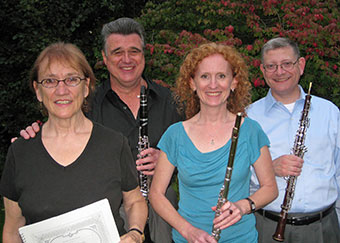Next story: Round 4, Week 2: Al Zuhri D. vs. Shapes of States
The Amberg Metamorphosis
by Jan Jezioro

Members of the Amberg Quartet re-group for a Friends of Vienna recital
When the very serious illness of a family member made it imperative for Buffalo Philharmonic Orchestra and Amberg Quartet flutist Betsy Reeds to travel out of state, the other members of the Amberg Quartet—clarinetist John Fullam, oboist/English horn player Paul Schlossman, and pianist Persis Vehar—had to make a decision about their upcoming performance in the Friends of Vienna concert series at the Unity Church this Sunday, March 13, at 3:30pm. They contacted FOV artistic director Mary Kay Atlas, and offered to play an entirely different program from the one originally announced, consisting of duos and trios. After contacting other FOV board members, Atlas made a quick decision to go with the new program.
The ability of the members of the Amberg Quartet to rapidly shift gears is due, at least in part, to their highly unusual combination of instruments: clarinet, flute, oboe/English horn, and piano. Remove any one of the instruments from this combination, and there is still a lot of music available for combinations of any of the other three instruments. Of course, much of this music is obscure and hard to come by, with the result being that it is very seldom heard in live performance.
The key to the Amberg’s ability to come up with neglected or even totally forgotten gems of the chamber music repertoire is the long-standing passion and ability of the group’s oboist, Schlossman, to ferret out unknown musical pieces. While Schlossman has become the go-to person for unusual repertoire, both for the Amberg Quartet and for the Camerata di Sant’ Antonio, he is quick to credit the influence of his mentor, Ronald Richards, who taught oboe performance at UB for more than 30 years and at the age of 80 still plays the oboe every day. Inspired by the works of J. S. Bach written for oboe and voice, Richards used his Eastman training in music history to compile the world’s largest collection of works for this combination.
Collecting obscure musical works was far more labor intensive in the pre-internet days, according to Schlossman. “We spent a lot of time and effort sending letters to places in the former Soviet bloc countries in our efforts to find either published copies, or in some cases, manuscripts of forgotten works,” Schlossman says. “At one point during my three years playing with the Jerusalem Symphony for Lukas Foss, both Ron and I unknowingly sent letters at the same time to the British Museum, seeking the same manuscript copy of what I think is the best 19th-century chamber music work written for English horn and piano, a virtuoso sonata by Carlo Yvon, that I made the first ever recording of, back in the 1970s.”
Sunday’s program includes Heinrich Molbe’s Scène des Sylphides, for clarinet, English horn, and piano, a work that Schlossman describes as “one long, gorgeous melody, written by the composer of a minor court in Germany, perhaps as incidental music for a ballet, or theatre performance.” Schlossman characterizes Gabriel Marie’s Leaves in the Wind, a trio for oboe, clarinet, and piano, as “Impressionistic, very French, with a hint of Bizet’s Carmen.” An arrangement for trio of a selection from Beethoven’s ballet The Creatures of Prometheus is also programmed, as well as Saint-Saëns’ Oboe Sonata, a work composed in the last year of his long life. The contemporary British composer Paul Harris is a clarinetist best known for his pedagogical training methods for gifted children; His attractive Sonatina for English Horn and Piano is a short, lively three-movement piece that combines simple harmonies with jazzy melodic twists.
BPO principal clarinetist John Fullam is spotlighted in Stravinsky’s 1919 Three Pieces for Solo Clarinet, a work composed as a present for Swiss philanthropist Werner Reinhart, an avid amateur clarinetist, who underwrote the composer’s L’histoire du soldat. Fullam will also join pianist and composer Persis Vehar in her Jukebox Dances for Clarinet and Piano, a delightfully whimsical work featuring movements with titles such as ‘Tango for Two Left Feet,” and “Buffalo Beguine.” Now in her 13th year as composer-in-residence at Canisius College, the multi-award-winning and prolific Vehar is currently involved in the final rehearsals for the premiere of her fifth opera, Eleanor Roosevelt, on March 26 and 27 in the Carrier Theater of the Civic Center, in Syracuse.
Tickets are $8 general admission, $6 for students. For more information, visit www.friendsofvienna.org.
Waiting for Watts
The organizers of the grass roots Ramsi P. Tick subscription series have not had an easy time of it this season. The series de facto season opening concert occurred last month, featuring the Buffalo debut of Greek violinist Leonidas Kavakos, an artist whom the BPO has also wanted to engage for several years, in a superb recital that demonstrated the unique ability of the Tick series to offer Buffalo audience performances by musical artists who do not appear on any other local series.
The group has been less lucky with legendary pianist André Watts, who has cancelled on two occasions this season. Watts is now rescheduled to appear at the Nichols School this Sunday, March 13, at 7:30pm, in an all-Liszt program, and a limited number of tickets are still available.
For more information, call 759-4778 or visit www.ramsitick.com.
blog comments powered by Disqus|
Issue Navigation> Issue Index > v10n10 (The Drinking Issue, week of Thursday, March 9) > The Amberg Metamorphosis This Week's Issue • Artvoice Daily • Artvoice TV • Events Calendar • Classifieds |









 Current Issue
Current Issue